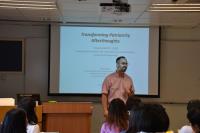4 September 2017
Evolution of China's Core Consumer Markets and Industries in the Past Decade – An Insider's View
For insights on the direction of the Chinese consumer market, few can match Mr. Kim Jin-Goon and his hands-on experience steering some of China's biggest retail brands and platforms. On September 4, Mr. Kim, a business leader in the private equity industry and former CEO of Li-Ning Sports Goods and China Grand Auto, gave a wide-ranging talk that captured the audience's attention through its sharp analysis of major trends in consumer industries such as auto and sportswear. An interactive format that featured challenging questions and colourful anecdotes aided those in attendance to follow Mr. Kim's lead in demystifying Chinese market dynamics.
15 September 2017
Book Forum: The Politics and Ethics of Patriarchy in 21st Century China: A Conversation about Sex, Family, and Power
At a book forum organized by the Centre on September 15, Prof. Gonçalo Santos, Joint Assistant Professor in the Department of Sociology and the Hong Kong Institute for the Humanities and Social Sciences at The University of Hong Kong, introduced the main findings of Transforming Patriarchy: Chinese Families in the Twenty-First Century, a recently published volume he co-edited with Prof. Stevan Harrell. There to discuss some of the volume's main themes were Prof. Petula S. Y. Ho from The University of Hong Kong as well as Prof. Gordon Mathews and Teresa Kuan from CUHK, while Prof. Ling Minhua from Center for China Studies served as moderator.
The volume sets out to explore the status and practice of patriarchy in China's age of radical social transformations. Although the institution of patriarchy continues to cast a long shadow over social relations in modern China, its content and associated practices have been recast and redefined, leading Prof. Santos to the conclusion that it is no longer dominating as China's default familial arrangement.
Among the major contributions of Transforming Patriarchy is its attempt to examine patriarchy from a China Studies perspective; at the same time the volume's contributors ask whether the concept is still relevant for debates on power and intimate life in our globalized, digital era. Informed by a wealth of sources and perspectives, the volume employs a number of case studies to analyse patriarchy in its complex iterations and practices, utilising lenses such as social class, geography, and globalization.










